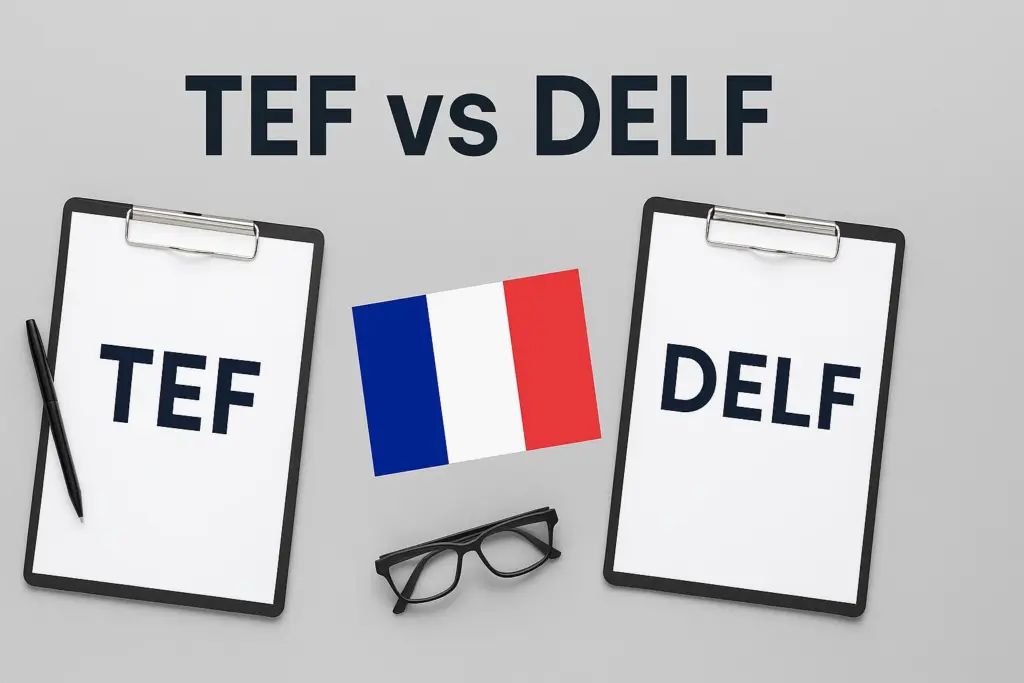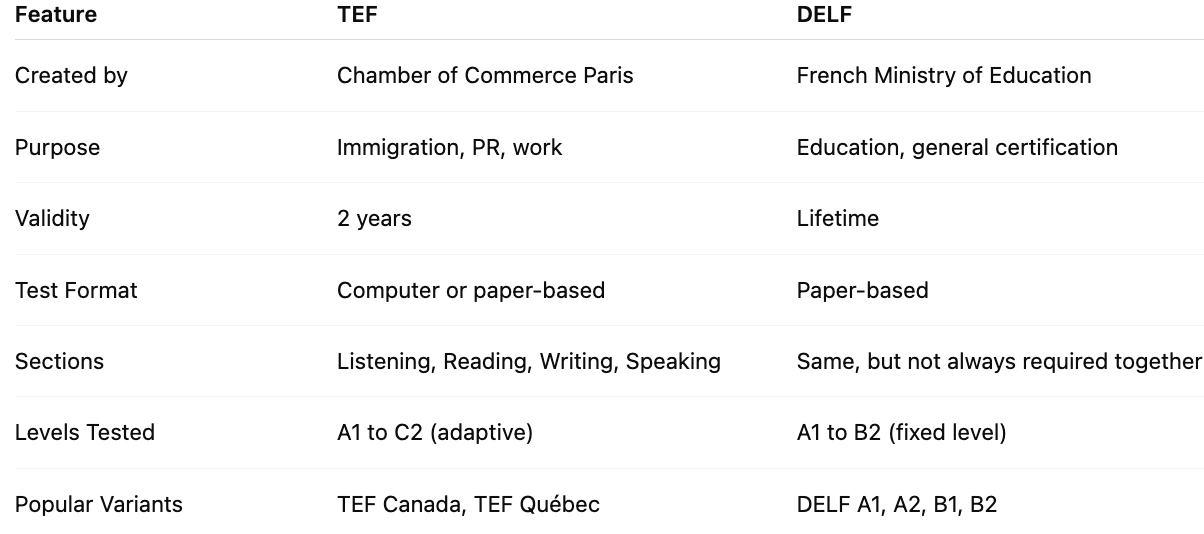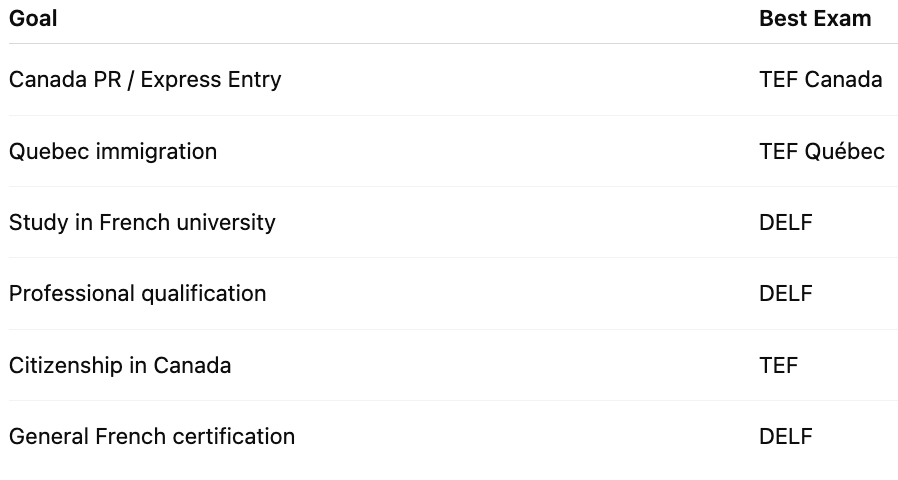
🇫🇷 TEF vs DELF: Which French Exam Should You Take?
If you’re planning to immigrate to Canada, study in France, or simply certify your French skills, you’ve likely come across two popular French exams: TEF and DELF.
But how do you choose between them?
In this comprehensive guide, we’ll break down everything you need to know about TEF vs DELF—including their purposes, formats, difficulty levels, scoring systems, and which one is best for your goals in 2025.
Thinking about immigrating to Canada through Express Entry or another PR pathway? 🇨🇦 You’re not alone—millions of applicants from across the globe are trying to earn those valuable Comprehensive Ranking System (CRS) points. But here’s a secret weapon many overlook: French for Canada PR.
In this in-depth guide, we’ll break down:
✅ Why French matters for Canadian immigration
📈 How many CRS points you can earn
📘 What tests you need (like TEF Canada)
🧠 How to start learning French—even from scratch
🎯 Pro tips to make your application stand out
Let’s get started with everything you need to know about French for Canada PR.
🧭 What Are TEF and DELF?
Before diving into TEF vs DELF, let’s define them.
✅ TEF (Test d’évaluation de français)
Created by: CCI Paris Île-de-France
Purpose: Assess French proficiency for immigration, citizenship, or work
Accepted by: Canadian immigration (IRCC), Quebec, and many universities
Test types: TEF Canada, TEF Québec (TEFAQ), TEF for studies
✅ DELF (Diplôme d’études en langue française)
Created by: French Ministry of Education
Purpose: Certify general French proficiency
Accepted by: French universities, employers, and schools globally
Test types: DELF A1 to B2, DALF C1 and C2 (advanced levels)
🧠 Which Exam Is More Widely Accepted – TEF or DELF?
Both TEF and DELF are globally recognized, but they serve different purposes:
TEF is accepted by immigration authorities, including:
IRCC (Canada PR, citizenship)
MIFI (Quebec immigration)
Some Canadian universities
DELF is accepted by:
French and Francophone universities
Employers across Europe
Visa and residency applications in France or Belgium
📌 If you’re planning to immigrate to Canada, TEF is required.
📌 If you want to study in France or prove academic-level French, DELF is preferred.
Understanding the difference in acceptance is a key part of choosing between TEF vs DELF.
🌐 Online vs Paper Testing – Which Is Easier?
Another major difference in TEF vs DELF is test format:
| Test | Format | User Experience |
|---|---|---|
| TEF | Computer-based | Fast-paced, adaptive, auto-graded |
| DELF | Paper-based | Slower, manual, more structured |
🧑💻 If you’re comfortable typing and working on a screen, TEF may feel easier.
✍️ Prefer handwritten essays and slower pacing? DELF will suit you better.
🎯 My Personal Recommendation
If you’re not sure which one to take, ask yourself:
“Do I want PR or permanent certification?”
If PR is your goal within the next year ➤ Take TEF Canada
If you want to prove academic French once, for life ➤ Go for DELF B2
And remember: Both tests require serious preparation. Don’t wing it.
🔍 TEF vs DELF for Quebec Immigration
If you’re planning to immigrate to Quebec, things work a bit differently.
Quebec accepts both:
TEF Québec (TEFAQ)
TCF Québec
🔎 Quebec’s points-based system gives value to French skills but doesn’t accept DELF or DALF for immigration.
So again, for PR or work in Quebec, the TEF route is your only valid option in the TEF vs DELF debate.
📝 Key Differences Between TEF vs DELF Feature

Let’s go deeper into TEF vs DELF and explore their real-world use.
✈️ Use Case #1: Immigration to Canada 🇨🇦
If your goal is to apply for Canadian Permanent Residency (PR) or citizenship, you’ll need to prove language proficiency.
🔹 Choose TEF Canada
Why? Because it’s the only French test accepted by IRCC for Express Entry.
✅ TEF Canada Exam Covers:
Listening
Reading
Writing
Speaking
You must take all four to qualify for CRS language points.
🧠 Bonus: Scoring NCLC 7 or higher in all sections gives you up to 50 extra CRS points.
If immigration is your goal, TEF vs DELF is no contest—TEF Canada is the clear winner.
🎓 Use Case #2: Studying or Working in France 🇫🇷
Planning to study at a French university? Applying for a job in France?
🔹 Choose DELF
Why? Because DELF is designed for academic and professional environments. It’s recognized by:
French universities
Employers across Europe
Visa and scholarship agencies
🎓 Most programs require DELF B2 or higher.
Also, the DELF is valid for life, unlike TEF, which expires in 2 years.
🧪 Exam Format Comparison – TEF vs DELF
✍️ TEF Format (TEF Canada Example):
✅ Computer-based
✅ Adaptive scoring
✅ Total score: out of 699

📘 DELF Format (Example: DELF B2):
✅ Paper-based
✅ Choose your level (A1 to B2)
✅ Total score: out of 100

🎯 Which Is Easier? TEF vs DELF
There’s no one-size-fits-all answer, but here’s what most learners say:
TEF is faster but more stressful, especially under time limits.
DELF is slower-paced, more academic, and allows for deeper responses.
✅ TEF is adaptive—questions get harder as you do better.
✅ DELF lets you pick your level, so you can train specifically for it.
🗣️ If you’re comfortable with fast reading and comprehension, TEF may suit you.
📝 If you prefer well-structured writing and speaking, DELF might feel more comfortable.
💰 TEF vs DELF Cost Breakdown
Prices vary by country and test center.
While TEF is more expensive, it can boost your CRS score and help you get PR faster—so it’s often worth the investment.

🎓 Which Exam Is Right for Me? Quick Decision Guide

🧠 TEF vs DELF Preparation Tips
🛠 TEF Preparation:
Use official TEF Canada samples from CCI Paris
Practice under strict time conditions
Record yourself speaking
Learn email & formal writing structure
Use apps like PrepMyFuture, GlobalExam
📚 DELF Preparation:
Study level-specific DELF prep books (B1, B2, etc.)
Practice academic-style writing
Focus on opinion-based speech and debates
Get a DELF-certified tutor
No matter your choice in TEF vs DELF, start prepping 3–6 months in advance.
🧩 Can You Use Both?
Yes! Many learners take TEF for PR and DELF later for career or academic purposes. They complement each other well.
So in some cases, the right answer to TEF vs DELF might actually be: both—at different stages of your journey.
❓ FAQs – TEF vs DELF
Q1: Is TEF harder than DELF?
TEF feels harder due to strict timing and computer-based format. DELF allows more flexibility, especially for writing and speaking.
Q2: Can I use DELF for Canada PR?
❌ No. IRCC does not accept DELF. Only TEF Canada or TCF Canada are accepted for Express Entry or PR.
Q3: Which test is better for a beginner?
DELF. It offers beginner-level exams (A1, A2) and is great for building foundation skills.
Q4: How soon can I retake TEF or DELF?
Usually, there’s no mandatory waiting period, but you’ll need to rebook and repay. Some centers limit frequency—check with yours.
Q5: Do I need to pass all sections?
Yes. For both exams, you must complete all components (listening, reading, writing, speaking). Scoring below the minimum in one may result in failure.
🧭 Final Thoughts – Choosing Between TEF vs DELF
Ultimately, the right French exam depends on your specific goal:
If your target is immigration to Canada, TEF Canada is the test you need.
If you’re planning to study or work in France or want a permanent certification, DELF is the way to go.
👉 Still unsure? Here’s the golden rule:
If a deadline or points system is involved ➤ TEF
If you’re building a long-term French profile ➤ DELF
✅ Ready to Take Action?
🎯 Choose your goal
📅 Set a test date
📘 Pick study resources
🧑🏫 Find a qualified tutor
🎧 Start daily practice today!
🎯 Final Tips to Succeed with French for Canada PR
🔁 Consistency is key—study daily
🧠 Focus on all 4 TEF skills equally
💬 Practice real conversations
🧪 Simulate test conditions often
👩🏫 Consider getting professional help for faster results
📥 Ready to Take Action?
If you’re preparing for Express Entry or any PR stream, don’t overlook the power of French for Canada PR. It’s more than just a language—it’s your shortcut to permanent residency.
🎓 Start today:
Take a placement test
Download TEF prep materials
Book a TEF-focused French class
Set a timeline and track your results
🇨🇦 Bonne chance on your Canadian dream!
Still scrolling? Here’s what you can do today:
📥 Download a TEF Canada prep checklist
📞 Book a free demo French lesson
📘 Buy a TEF-specific prep book
📅 Set your NCLC 7 goal timeline
💬 Join a WhatsApp group for French learners
Remember: Every week you wait, someone else learns French and moves ahead of you in the pool.
Let French for Canada PR be your shortcut to permanent residency — and your new life in Canada 🇨🇦.
🔚 Conclusion (Extended)
Whether you’re chasing permanent residency, aiming to study abroad, or just want an official certificate of your French skills, choosing the right test matters.
The TEF vs DELF comparison isn’t about which is “better”—it’s about which is right for you.
So make your decision based on:
🎯 Your short- and long-term goals
💡 Your current French level
🧪 Your comfort with test formats
📅 Your immigration timeline
Start preparing early. Invest in the right prep materials. And if needed, hire a tutor familiar with your exam of choice.
Bonne chance! 🇫🇷✨
Trusted Resources for French Learners


